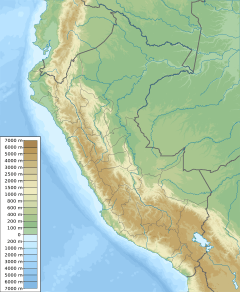Sitaq facts for kids
Quick facts for kids Sitaq |
|
|---|---|
| Highest point | |
| Elevation | 5,304 m (17,402 ft) |
| Geography | |
| Location | Peru, Huancavelica Region |
| Parent range | Andes, Chunta |
| Climbing | |
| First ascent | 1961 |
Sitaq is a tall mountain located in the Andes mountain range in Peru. It stands about 5,304 meters (17,402 feet) high, which is taller than many clouds! The name Sitaq comes from the Quechua language, which is spoken by many people in the Andes. Sometimes, you might see its name spelled Citac, which is a Spanish way of writing it.
Sitaq is part of the Chunta mountain range, a smaller group of mountains within the huge Andes. It is found in the Huancavelica Region of Peru. Specifically, it sits right on the border between two districts: Acobambilla and Nuevo Occoro. The mountain has a unique shape, with its ridge forming a semicircle. This curved part of Sitaq is located to the west of a lake called Tipiqucha.
Contents
Exploring the Andes Mountains
The Andes are the longest mountain range in the world. They stretch along the western side of South America. These mountains are famous for their amazing landscapes and diverse wildlife. Many tall peaks, like Sitaq, are part of this incredible natural wonder.
How Mountains Form
Mountains like Sitaq are formed over millions of years. This happens when huge pieces of the Earth's crust, called tectonic plates, slowly push against each other. When these plates collide, the land gets folded and pushed upwards, creating towering peaks. The Andes are still growing today!
Life in the Andes
Even though the Andes are very high and can be cold, many plants and animals call them home. You can find unique species that have adapted to the mountain environment. People also live in the Andes, often in small villages. They have developed special ways of life to thrive in this challenging but beautiful region.
The Huancavelica Region
Sitaq is located in the Huancavelica Region of Peru. This region is known for its rugged mountains and deep valleys. It is also rich in history and culture. Many people in Huancavelica speak Quechua, the language from which Sitaq gets its name.
Local Geography Around Sitaq
The area around Sitaq is typical of the high Andes. It features steep slopes and rocky terrain. The lake Tipiqucha is an important feature nearby. Lakes in these high mountain areas are often fed by melting snow and glaciers. They provide water for local communities and wildlife.
Climate and Environment
The climate around Sitaq is cold and windy, especially at its high elevation. Temperatures can drop below freezing, and snow is common. Despite the harsh conditions, the environment supports tough, high-altitude plants. These plants are important for the animals that live there.
Climbing Sitaq
Sitaq was first climbed in 1961. Climbing mountains like Sitaq requires special skills and equipment. Climbers need to be prepared for the cold weather, thin air, and difficult terrain. It is a challenging adventure that offers amazing views from the top.
Safety in Mountain Climbing
Climbing tall mountains is exciting but also risky. Climbers must always prioritize safety. This includes checking weather forecasts and having the right gear. It also means climbing with experienced guides. Respecting the mountain and its environment is very important for all climbers.
See also
 In Spanish: Cítac para niños
In Spanish: Cítac para niños
 | Charles R. Drew |
 | Benjamin Banneker |
 | Jane C. Wright |
 | Roger Arliner Young |


